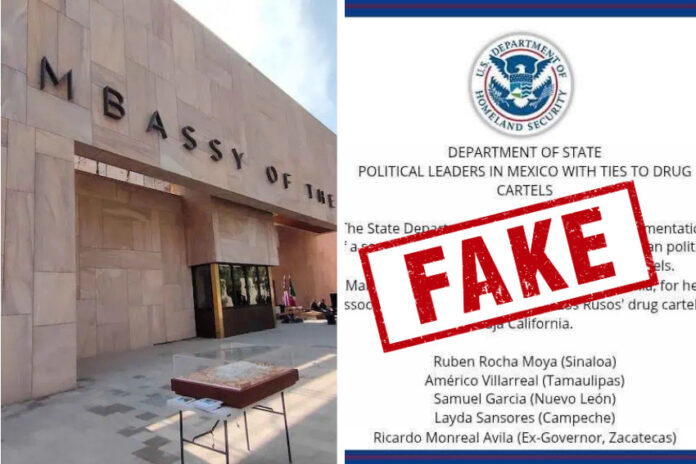by the El Reportero’s wire services
The United States Embassy in Mexico denounced as “false” a supposed U.S. government statement that purported to identify various “political leaders in Mexico with ties to drug cartels.”
The embassy published the “false” statement to social media on Tuesday in a post that included a five-word message:
“WARNING. This information is false.”
The Embassy of Mexico in the United States also denounced the statement as “false.”
“About the supposed information that circulates on some [social media] accounts regarding a statement of the [U.S.] Department of State about Mexico, this embassy confirms that it is completely false,” it said.
Which politicians were named in the fake statement?
The statement denounced by the U.S. and Mexican embassies includes a U.S. Department of Homeland Security seal and has the heading “DEPARTMENT OF STATE POLITICAL LEADERS IN MEXICO WITH TIES TO DRUG CARTELS.”
It states:
“The State Department has confirmed the implementation of a secret sanctions mechanism targeting Mexican political figures identified as having ties to drug cartels. Marina del Pilar [Ávila], the Governor of Baja California, for her association with the leader of the ‘Los Rusos’ drug cartel in Baja California.
Ruben Rocha Moya (Sinaloa)
Américo Villareal (Tamaulipas)
Samuel García (Nuevo León)
Layda Sansores (Campeche)
Ricardo Monreal Ávila (Ex-Governor, Zacatecas)”
Rocha, Villareal, García and Sansores are current state governors. Monreal is the leader of the ruling Morena party in the lower house of Congress.
The context
The circulation of the fake statement on social media and the U.S. and Mexican embassies’ denunciation of it came after Marina del Pilar Ávila revealed last month that the United States had revoked tourist visas for her and her husband, Carlos Torres Torres.
The Baja California governor asserted she hadn’t done anything wrong, declaring that the revocation of her visa was “an administrative decision, not an accusation.”
She rejected claims that she is involved in money laundering. The United States government hasn’t revealed the reason why it revoked the tourist visas of Ávila and Torres, who, like his wife, is a Morena party politician.
Citing unnamed United States officials, the U.S. investigative journalism organization ProPublica reported on May 15 that “the Trump administration has begun to impose travel restrictions and other sanctions on prominent Mexican politicians whom it believes are linked to drug corruption.”
“So far, two Mexican political figures have acknowledged being banned from traveling to the United States,” ProPublica said, referring to Ávila and her husband.
“But U.S. officials said they expect more Mexicans to be targeted as the administration works through a list of several dozen political figures who have been identified by law enforcement and intelligence agencies as having ties to the drug trade. The list includes leaders of President Claudia Sheinbaum’s governing party, several state governors and political figures close to her predecessor, former President Andrés Manuel López Obrador, the U.S. officials said.”
A few days before ProPublica published its report, journalist Salvador García Soto wrote in a column for the newspaper El Universal that the Trump administration, “through its powerful Secretary of State Marco Rubio has commenced the ‘hunt’ for Mexican politicians, which, according to their investigations, have links to drug trafficking.”
García asserted that the Department of State has a so-called “list of Marco” that includes “at least 44 names of prominent officials and politicians” from Mexico with alleged links to drug trafficking, including federal ministers, governors, mayors and lawmakers.
He wrote that the list includes “politicians from all existing parties in Mexico,” but “the majority of those mentioned are active members of Morena, the party of President Sheinbaum, and some have a very close relationship with her and with the ex-president López Obrador.”
Asked on May 15 about a supposed U.S. “narcolista,” or “narco-list,” that includes the names of “narcogobernadores” (narco-governors) and other officials, Sheinbaum responded:
“There are a lot of rumors. They are rumors.”
She said that her government had not received any notification from the United States government about the existence of “lists” of politicians with links to drug cartels.
“In this case, you ask the Department of State and you’re told ‘No, there is nothing,’” Sheinbaum said.
On Wednesday, she expressed surprise that the U.S. Embassy felt the need to denounce the fake statement (and clearly fake at that) that has been disseminated on social media.
For its part, the government of Tamaulipas last month rejected claims that Villareal’s U.S. visa had been revoked.
ProPublica said in its report that the Morena party governor of the northern border state “has been frequently accused of having ties to drug trafficking, which he has denied.”
In early 2024, ProPublica, German state-owned news organization Deutsche Welle and crime-focused media outlet Insight Crime all published reports that said that people working for the 2018 presidential election campaign of former president López Obrador received between US $2 million and $4 million from drug traffickers affiliated with the Beltrán-Leyva Organization and the Sinaloa Cartel.
López Obrador rejected the reports, describing them as “completely false.”
By Mexico News Daily chief staff writer Peter Davies (peter.davies@mexiconewsdaily.com)



